Navigating the eCommerce platform can be difficult, particularly when choosing between Shopify vs Shopify Plus. Both platforms provide potent tools, but their distinctions take time to be noticeable. To assist you in making an informed decision, let's look at the key differences and evaluate which platform best fits your growth goals.
Continue reading to gain:
- A quick comparison of Shopify vs Shopify Plus;
- Detailed comparison of all features;
- Which one is most suited to your company's growth?
Let's get started!
Shopify vs Shopify Plus: A Quick Verdict
On one hand, Shopify's core focus is on assisting small and medium-sized businesses in their online product sales efforts. Whether you're just starting in the retail industry or want to expand your business to incorporate online sales, the basic Shopify plans cover it all.
Read more: Shopify Review: Is It The Best Website Builder for eCommerce
Shopify Plus, on the other hand, is tailored to larger enterprises, such as Converse and Sony. Built on Shopify's foundation, Shopify Plus offers advanced features and a pricing model to meet the demands of high-volume businesses.
Read more:
- Shopify Plus Reviews [year]: All Pros & Cons and Features Breakdown
- What is Shopify Plus: All Features & Benefits Breakdown
Don't have time to read the complete article? Here's a quick comparison of Shopify vs Shopify Plus features to help you make a decision:
Feature | Shopify | Shopify Plus | Winner |
Pricing | Tiered plans (Basic, Shopify, Advanced) with fixed monthly fees and transaction fees. | Custom pricing based on business needs, typically starting at $2,300/month, with no transaction fees for most payments. | Shopify |
Customization and Flexibility | Limited customization options, focused on design aesthetics. | Extensive customization, including code access and advanced features. | Shopify Plus |
Support and Resources | Basic customer support, and limited training resources. | Dedicated support teams, priority support, exclusive resources, and professional services. | Shopify Plus |
Scalability | Suitable for small to medium-sized businesses, limited scalability. | Designed for high-growth companies, handles high traffic and sales volumes, and offers multiple stores. | Shopify Plus |
Transaction Fees | Card processing fees apply. Additional transaction fees for third-party payment providers (except on Shopify Payments). | Card processing fees apply. No additional transaction fees when using Shopify Payments. 0.20% fee for third-party processors. | A tie |
Integrations and Apps | Extensive app store, limited API access. | Larger app ecosystem, advanced API access, exclusive apps. | Shopify Plus |
Headless Commerce | Limited headless capabilities. | Robust headless commerce solution with Storefront API and development tools. | Shopify Plus |
Security Features | Basic security features (SSL, PCI compliance). | Advanced security features, including custom SSL certificates and fraud protection. | Shopify Plus |
Performance and Speed | Solid performance for small to medium-sized businesses. | Superior performance, server uptime guarantees, and infrastructure enhancements. | Shopify Plus |
Automation and Workflow | Basic automation tools. | Advanced automation with Shopify Flow, custom workflows, and integrations. | Shopify Plus |
Globalization | Basic multi-channel capabilities, limited market customization (3 default markets), and support for multiple currencies and languages. | Robust multi-channel selling with support for multiple currencies, languages, and marketplaces. Advanced features like a built-in tax engine, third-party logistics integration, and legal services for international compliance. | Shopify Plus |
Brand and Custom Domain Management | Limited domain management options. | Extensive domain management with up to 1,000 domains or subdomains. | Shopify Plus |
Shopify vs Shopify Plus: Pricing (Shopify wins)
Verdict
Shopify wins the battle of affordability, offering clear-cut pricing plans that are ideal for smaller businesses. Shopify Plus, while catering to larger enterprises with advanced features, comes with a higher price tag that may not be feasible for all businesses.
Shopify offers a tiered pricing structure to accommodate businesses of various sizes. This includes the Basic, Shopify, and Advanced plans for startups, growing companies, and high-volume sellers, respectively. While these plans differ in terms of features and transaction fees, they share a common characteristic: a fixed monthly cost.
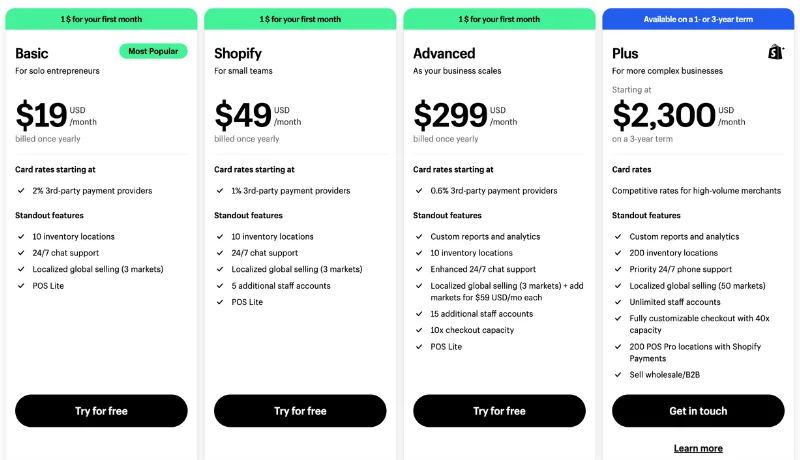
In contrast, Shopify Plus is a higher-level solution for more giant enterprises. Its pricing structure is more flexible, with a base cost of $2,300 per month. However, the final price tag is determined by individual business needs and requires a customized quote. While this might seem steep for smaller businesses, it can be a cost-effective option for high-volume sellers. By eliminating transaction fees on most of the payments, Shopify Plus offers cost savings to those selling thousands of products each month.
Shopify Plus vs Shopify: Customization and Flexibility (Shopify Plus wins)
Verdict
Shopify Plus is the clear winner in terms of customization and flexibility. While Shopify offers a solid foundation for smaller businesses, Shopify Plus provides the tools and capabilities necessary to create a truly differentiated online store.
The choice between Shopify vs Shopify Plus depends on a business's specific needs and growth aspirations. Shopify offers a degree of customization, allowing merchants to tailor their stores within a specific scope. For instance, users can select between a variety of themes and change colors, fonts, and layouts according to their brand appearance. The Shopify App Store provides additional tools that improve the functionality of stores, such as product reviews, shipping calculators, and marketing features. However, Shopify's limitations become readily apparent for businesses seeking in-depth customization.
Would you like to have complete control over your online store and provide your consumers with a unique shopping experience? Shopify Plus allows you to do so, providing you with an extensive set of tools and capabilities, including:
- Shopify Functions: This allows for advanced backend customization without extensive coding, enabling tailored discounts, shopping cart behavior, payment options, and order fulfillment processes. By leveraging Shopify Functions, businesses can create highly targeted automated promotions, resulting in an average 20% increase in order value.
- Checkout Customization: Merchants can create unique checkout experiences by adding custom fields, implementing validation rules, and designing checkout pages that align with their brand.
- Script Editor: A tool for creating customer-specific scripts on dynamic pricing, promotions, etc.
Shopify Plus vs Shopify: Support and Resources (Shopify Plus wins)
Verdict
Shopify Plus is much better in terms of support and resources than Shopify. With dedicated teams, priority support, and professional services, Shopify Plus helps businesses succeed.
Shopify has the standard channels for customer support: email, phone, and live chat. Merchants also have access to a knowledge base and online resources in Shopify Academy. Nevertheless, the level of support and available resources is relatively limited.
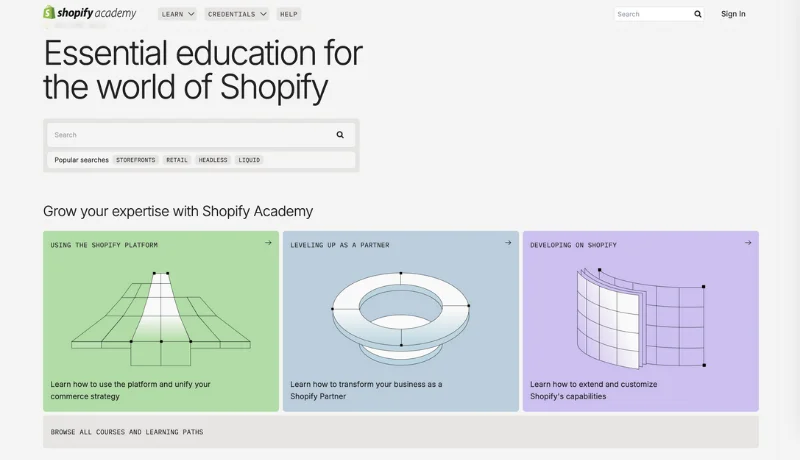
On its part, Shopify Plus provides a more comprehensive support package, including:
- Dedicated support teams: Launch Manager for setup and Merchant Success Manager for ongoing assistance.
- Priority support: 24/7 access to support channels.
- Professional services: Expert design and development support for complex projects.
- Exclusive resources: Shopify Academy and specialized webinars.
Shopify vs Shopify Plus: Scalability (Shopify Plus wins)
Verdict
When comparing Shopify Plus vs Shopify in terms of scalability, Shopify Plus is the clear winner. Shopify's scalability is suitable for smaller businesses, while Shopify Plus offers the robust infrastructure and features required by high-growth enterprises.
Shopify offers a solid foundation for small to medium-sized businesses, allowing for gradual growth. While it can handle increasing sales volumes to a certain extent, its scalability limitations may become apparent as the business expands. For example, Shopify's regular plans may need help in cases of significant traffic spikes or large order volumes.
In contrast, Shopify Plus is designed for high-growth businesses and offers superior scalability. With the ability to handle significantly higher traffic and sales volumes, Shopify Plus is ideal for large enterprises. Key features contributing to Shopify Plus's scalability include:
- Unlimited staff accounts
- Shopify POS Pro
- Up to nine scalability stores
While Shopify Plus comes at a higher price point, the investment often pays off in terms of increased sales, improved efficiency, and reduced operational costs.
Shopify vs Shopify Plus: Transaction Fees (A tie)
Verdict
This Shopify vs Shopify Plus round is a tie since both plans can avoid additional transaction fees when using Shopify Payments.
Shopify offers different transaction fee structures across its plans, including Shopify Plus. When using Shopify Payments, available in select countries and regions, users on any plan can avoid additional transaction fees from Shopify. However, they still pay card processing fees, with Shopify Plus offering the lowest rates.
If opting for a third-party payment processor, all plans incur a 0.20% fee per transaction for security and compliance, except for the standard Shopify plan, which has a higher fee. This structure applies globally, providing potential savings for high-volume merchants on Shopify Plus, especially when using Shopify Payments as their primary gateway.
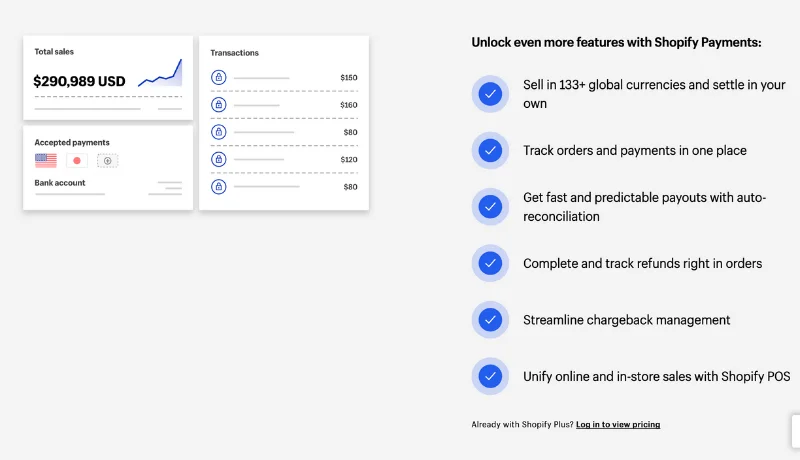
Shopify vs Shopify Plus: Integrations and Apps (Shopify Plus wins)
Verdict
Shopify Plus surpasses Shopify in terms of app access, offering exclusive applications and superior API integration.
As of this writing, over 8,000 apps are available on Shopify's app store. This makes up a wide range of options for any merchant seeking to add extra functionality to their online business. While both platforms offer a robust app ecosystem, the Shopify Plus vs Shopify comparison reveals distinct differences in app availability and functionality.
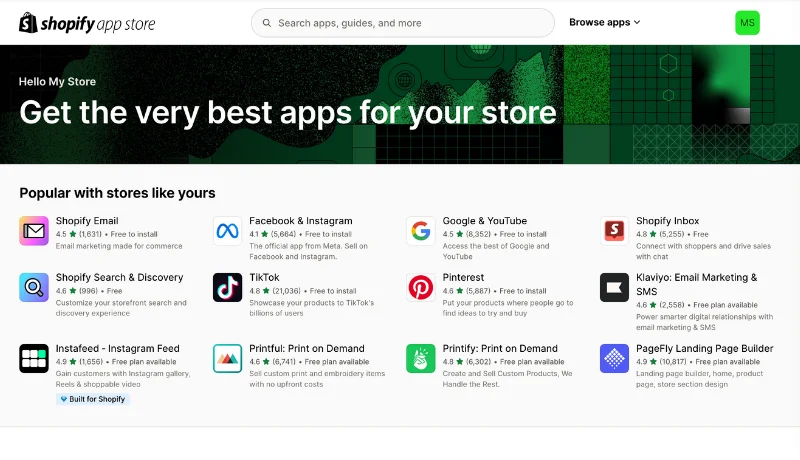
With Shopify Plus, you're going to have far more apps at your reach and increased integration features. Shopify Plus users can leverage apps designed for advanced features, including those for gift card management, user management, and complex store operations. Additionally, Shopify Plus provides expanded API access, enabling custom app integrations and greater flexibility in in-store customization.
Shopify vs Shopify Plus: Headless Commerce (Shopify Plus wins)
Verdict
For companies that require advanced customization and flexibility, Shopify Plus is the better option because of its superior headless commerce solution.
Headless commerce means separating the storefront (front-end) from the backend eCommerce platform. This lets businesses create more flexible and personalized shopping experiences. However, there are significant differences between Shopify vs Shopify Plus’s headless commerce features.
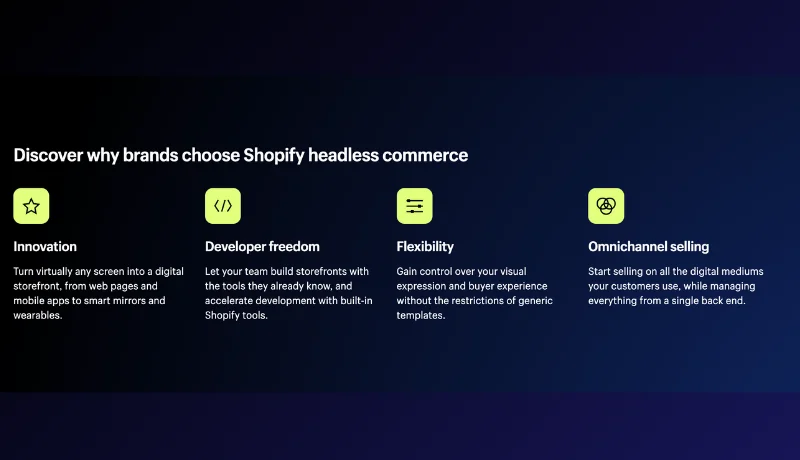
Shopify's core platform offers a limited number of headless possibilities, with a focus on fundamental integrations. While it is feasible to create custom shops, the process can be more complicated and restrictive than Shopify Plus.
On the contrary, Shopify Plus is built with headless commerce in mind. It provides a powerful Storefront API, which enables developers to design highly customizable front-end experiences. Shopify Plus also includes Hydrogen and Oxygen development tools to make building these custom stores easier and faster. With a broader range of integrations and customization options, Shopify Plus is ideal for businesses that need a highly advanced online store.
Shopify vs Shopify Plus: Automation and Workflow (Shopify Plus wins)
Verdict
Shopify Plus outperforms standard Shopify in automation and workflow. It has superior automation capabilities that aren't available on basic plans, including custom partner app tasks and higher API limits for complex operations.
When comparing automation and workflow capabilities between Shopify vs Shopify Plus, the outcome is similar since both plans allow the usage of Shopify Flow. Nevertheless, Shopify Plus provides enhanced functionality and flexibility.
Standard Shopify plans (Basic, Shopify, and Advanced) allow merchants to use most features of Shopify Flow, including options for the automation of repetitive processes. The Advanced plan also enables the Send HTTP Request task, expanding integration possibilities.
Shopify Plus, however, takes automation a step further. It offers exclusive access to tasks created by custom partner apps, providing more specialized and tailored automation solutions. Additionally, Shopify Plus merchants benefit from higher API usage limits, allowing for more extensive and frequent automated processes.
This enhanced automation capability in Shopify Plus enables larger businesses to streamline operations more effectively, which can save massive amounts of time and increase effectiveness.
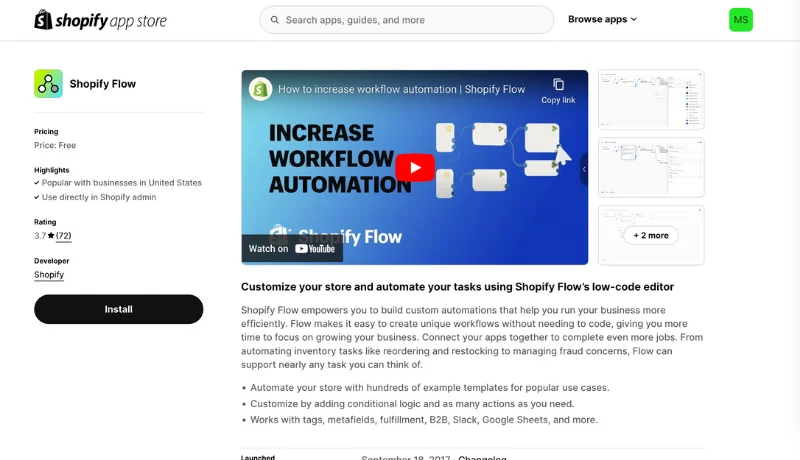
Shopify vs Shopify Plus: Globalization (Shopify Plus wins)
Verdict
Shopify Plus wins decisively. Its extensive market customization and advanced globalization features far outpace standard Shopify plans.
Both Shopify and Shopify Plus have tools for expanding internationally, but Shopify Plus offers much more powerful features. Standard Shopify plans include basic globalization options, such as support for multiple currencies and languages. They also offer 3 default markets, allowing for some regional customization.
Shopify Plus, on the other hand, takes the concept of globalization even further. It enables businesses to create up to 50 customized markets, each with tailored settings for currency, language, and localized storefronts. This extensive customization allows for more nuanced global strategies and better customer segmentation.
Furthermore, Shopify Plus offers advanced features. These include a built-in tax engine for automated multi-country tax collection, integration with third-party logistics providers for efficient cross-border delivery, and legal services to navigate international compliance issues. While Advanced Shopify users can pay extra for additional markets, the comprehensive tools in Shopify Plus make it the superior choice for businesses serious about international expansion.
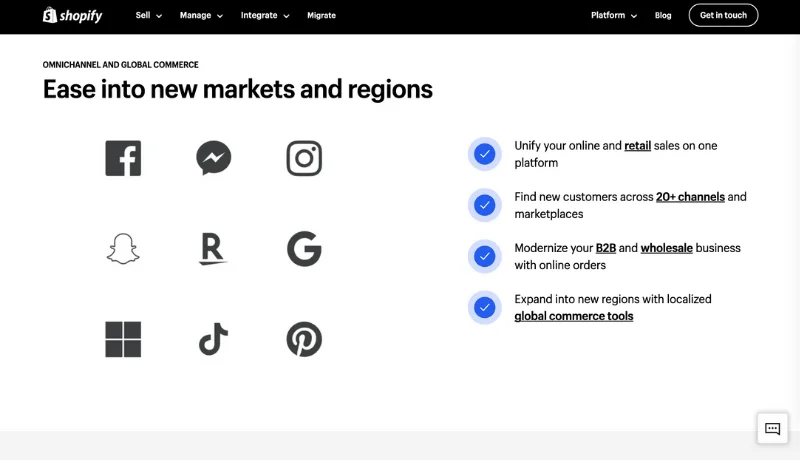
Shopify vs Shopify Plus: Brand and Custom Domain Management (Shopify Plus wins)
Verdict
Shopify Plus has triumphed in this round. With a 1,000-domain limit versus Shopify's 20, it offers unmatched scalability for multi-brand and global enterprises.
Both Shopify and Shopify Plus allow users to connect custom domains and subdomains to their stores, enhancing brand recognition and professionalism. Nevertheless, when it comes to scale, Shopify Plus is head and shoulders above Shopify.
Shopify lets you connect up to 20 domains or subdomains by default, but with Shopify Plus, you may connect up to 1,000. This is absolutely essential for companies that are in charge of multiple brands, regional stores, or complex marketing campaigns. Users with Shopify Plus can create a more polished and personalized web presence with additional domains at their disposal.
Shopify vs Shopify Plus: Performance and Speed (Shopify Plus wins)
Verdict
To no surprise, Shopify Plus outperforms its rival in this round. If performance and speed are your top priority, then Shopify Plus is the optimal choice.
Shopify Plus prioritizes performance and reliability, offering impressive server uptime guarantees and robust infrastructure. This ensures minimal downtime, even during peak traffic periods.
On the other hand, heavy traffic levels may affect Shopify's performance. For enterprises where every second of downtime equals lost revenue, performance and speed are essential.
Shopify vs Shopify Plus: Security Features (Shopify Plus wins)
Verdict
When comparing security features, Shopify Plus stands head and shoulders above the competition thanks to its enhanced fraud detection tools and the ability to add custom SSL certificates.
Both Shopify and Shopify Plus prioritize security, offering SSL certificates and PCI compliance to protect customer data. Nonetheless, Shopify Plus has higher security levels through improved fraud detection tools and the ability to add custom SSL certificates.
These enhanced security features are crucial for businesses handling sensitive customer information and meeting regulatory requirements. While Shopify offers fundamental security protections, Shopify Plus caters to the heightened security needs of larger enterprises.
Shopify vs Shopify Plus: Which One is the Perfect Fit for Your Business Growth?
By going through all the key differences between Shopify vs Shopify Plus in different respects, it's time to determine the optimal platform for your business.
Shopify is ideal for:
- Small and medium-scale businesses
- Businesses with limited budgets
- Those starting out or with modest sales volumes
- Those looking for an easy-to-use platform with core features
Shopify is well-suited for:
- High-growth businesses aiming for rapid expansion
- Enterprises with complex operations and large-scale product catalogs
- Businesses targeting customization, performance, and scalability.
- Those needing advanced features, dedicated support, and the ability to handle high-traffic volumes.
Looking for a way to switch your Shopify website? LitExtension: #1 Shopping Cart Migration Expert can help you out. We have been assisting clients with safe and speedy migrations for 12 years and have a 99% satisfaction rating. Read our Shopify guides or join the community group to get helpful hints and advice. To help you succeed in eCommerce to the fullest, we have compiled a wealth of valuable ideas and tactics.
Migrate to Shopify Plus with LitExtension
Now that we've learnt what is Shopify Plus and understood its powerful benefits for high-growth businesses, the next step many merchants consider is how to move their existing store to this enterprise-level platform. However, transitioning to a new destination can be a complicated process because merchants can face valuable data loss and disruption to daily operations.
Understanding your struggle during this decision, LitExtension is here to assist. Proud to be the #1 eCommerce migration expert in the market, we've been helping thousands of e-merchants migrate their online stores from one platform to another with utmost accuracy and security.
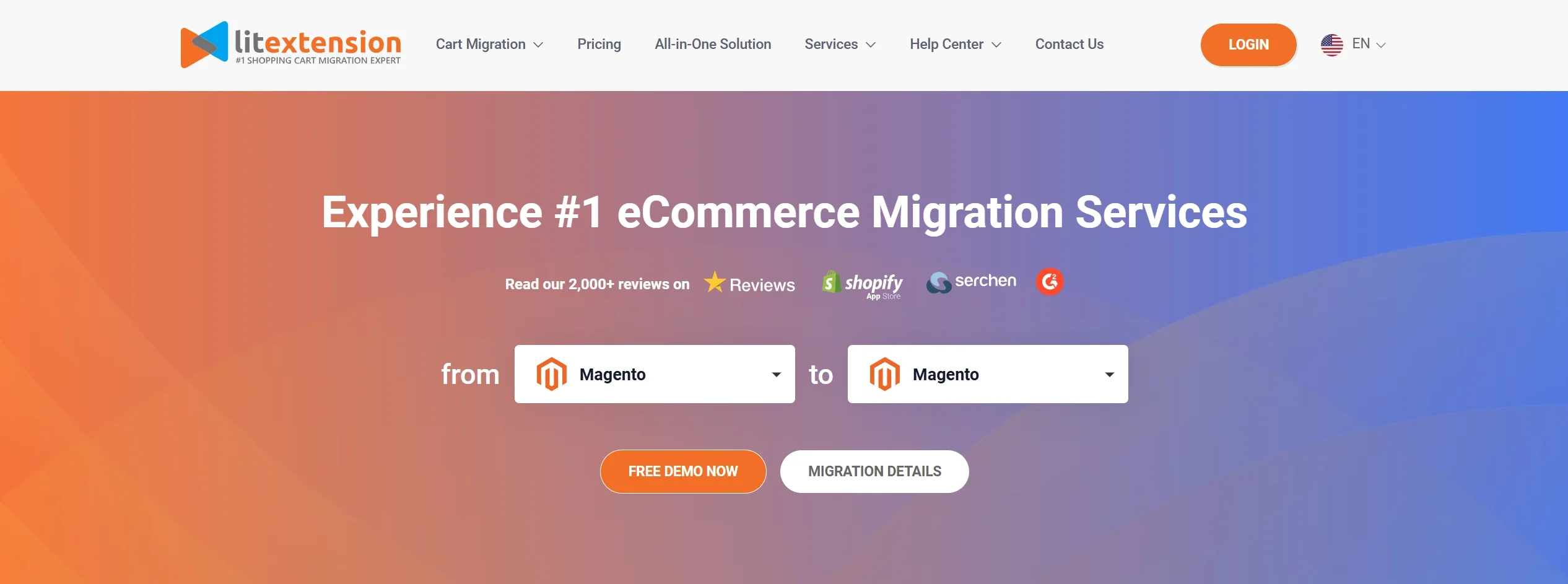
At LitExtension, we guarantee to deliver:
- Precise and reliable migration: LitExtension guarantees to transfer all your store data, including products, customers, and orders, from one eCommerce platform to another with complete accuracy and security.
- Customer privacy assurance: We use advanced encryption and strict security measures to keep all sensitive business and customer information fully protected during the migration process.
- Personalized migration experience: Every migration is tailored to meet the unique needs of your business, with full support for metadata, custom fields, and any specific requirements you may have.
- Dedicated Personal Assistant: From the first consultation to post-migration support, a dedicated assistant is always available to provide timely guidance, expert troubleshooting, and clear answers to any questions.
- Clear delivery process: Our expert team carefully analyzes your requirements and provides a detailed migration timeline, ensuring the process stays on schedule and meets your deadlines.
- Keep selling while migrating: LitExtension guarantees 100% uptime for your store during the entire migration, so there is no interruption to your sales or business performance.
By choosing LitExtension, merchants can migrate to Shopify Plus with confidence, knowing their store will be transferred quickly, securely, and without any downtime.
Seamlessly migrate your store to Shopify Plus
LitExtension can safely transfer your data to unlock more growth on the new platform.

Shopify Plus vs Shopify: FAQs
What's the difference between Shopify and Shopify Plus?
Shopify is tailored for small to medium businesses with core eCommerce features. On the other hand, Shopify Plus has all the standard Shopify inclusions, plus more advanced functionalities, scalability, and dedicated support for larger enterprises.
Do you need Shopify Plus for B2B?
The B2B feature is exclusively available to stores on the Shopify Plus plan. While Shopify can support some B2B aspects, Shopify Plus provides more comprehensive tools and features specifically designed for B2B commerce.
When should you switch to Shopify Plus?
Consider switching to Shopify Plus when your business outgrows Shopify's limitations. This typically occurs when online sales reach around $80,000 per month, but individual needs may vary. Factors such as sales volume, order complexity, and customer support requirements should also be considered. You can also take benefit of LitExtension's Shopify Plus migration service to simplify the transition.

